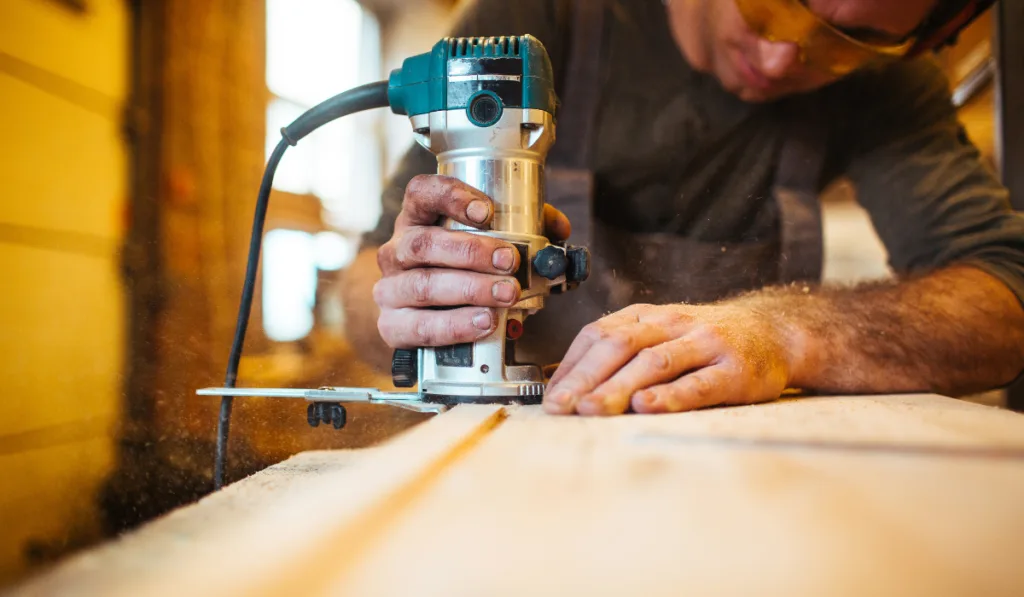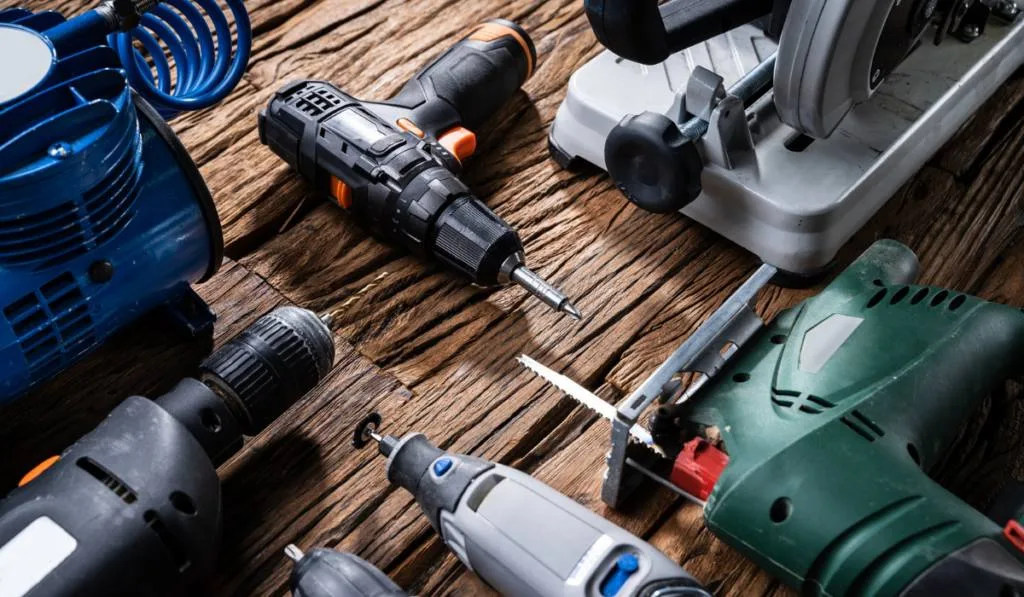*This post may have affiliate links, which means I may receive commissions if you choose to purchase through links I provide (at no extra cost to you). As an Amazon Associate, I earn from qualifying purchases. Please read my disclaimer for additional details.
There is an endless debate about Ryobi power tools versus the more expensive Dewalt power tools. If you do a quick internet search, you will find dozens of articles from reviewers who claim that Ryobi must be much worse of the two because they are “cheaper.”

However, is that true? For this article, we will take research from both sides and try to ignore the myths and anecdotes from so-called ‘authorities” who base much of their reviews on price.
Ryobi Vs. Dewalt: Which is better?
When comparing the power tools made by Ryobi and Dewalt, the history of this debate focuses on the price point. Ryobi is less expensive, but it can function in much the same way as Dewalt when looking at the warranty, battery life, and tools types.
Though they are similar in some ways, Ryobi and Dewalt are pretty different. Keep reading to learn more about their origins and what makes them great.
Table of Contents
What are the History and Background of Ryobi Vs. DeWalt?
When you start to look at a company, it may be a good idea to view it through the history that formed its products. Each of these brands has fascinating accounts associated with them.
The history of each company has branded them the way they are today. So, it is essential to understand where the companies have come from to know how they are perceived and, in some cases, misperceived, today.
History And Background Of DeWalt
The brand of DeWalt is known to be reliable and efficient power tools that are used at worksites across America and the world. However, there is a myth of the folksy background of the company that is just false.
The aura surrounding DeWalt is based on the founder, Raymond DeWalt, and how the company is a solitary business that is 100% American made and operated as a small family business.
This is entirely false because DeWalt is just one branch under the huge conglomerate corporation of Stanley Black and Decker.
DeWalt has been under the care of this corporation since the 1940s (source)! DeWalt remains a trusted and renowned name in construction tools today, a title that its corporate owners lean on heavily for marketing purposes.
History And Background Of Ryobi
Ryobi is a company that is run in much the same way as DeWalt. Ryobi is owned by the vast Hong Kong company named,”Techtonic Industries”, which is an international corporation, just like Stanley, Black, and Decker.
Also, the “American made” folksy appeal of the DeWalt name compared to Ryobi is unmistakably false.
Both are made in various countries across the world, including China. While DeWalt makes many more products in its several US manufacturing sites, Ryobi also has one US manufacturing site.
Ryobi Vs. DeWalt Warranties
When you buy your tools, you expect them to be durable and last. Sure, tools can break, but when using them, usually, they should last for many years if you take care of them.
The industry standard for power tools is a three-year standard limited warranty. Both Ryobi and DeWalt have identical 3-year limited warranty plans for their power tools.
But, you may wonder why wouldn’t a more superior company and brand like DeWalt have a better warranty. To figure this out, we have to look at the tools themselves.
Ryobi vs. DeWalt: Battery Life
Each of the DeWalt and Ryobi power tools has various options when it comes to battery power. But, we want to look at the battery life of each to see which is better. Lithium batteries are the industry standard, and each brand claims that their battery has been upgraded in recent years.
Let’s look at each to compare the battery life of Ryobi and DeWalt lithium batteries. Although lithium-ion batteries are available by Ryobi and DeWalt, not to mention most other power tool manufacturers, some factors make each cell better or worse. Below are the different technical factors that influence battery life and performance.
Memory Effect
According to an article about batteries available on PubMed, Nickel-cadmium rechargeable batteries are allegedly supposed to lose their life of battery power the more they are used.
This is seen in cells that are charged after only being partially discharged. However, some cells have a better memory than others.
Self-Discharge Rate
A self-discharge rate is the amount of time that it takes a battery to lose its charge when not in use. So, if you leave your tools in the garage for a long break and then come back to them after weeks of not using them, you may find that they have lost power due to the self-discharge rate.
Ryobi Lithium Batteries
In the 18v power supply from a Ryobi lithium battery, the company claims that the battery can last 40% longer than base lithium batteries.
The charge time of these batteries can take anywhere between 30 minutes to up to 60 minutes for a full charge.
Ryobi batteries have a decent life and can last anywhere from 2 to 3 years, depending on use. This is comparable to the DeWalt battery. The self-discharge rate of Ryobi batteries is known to be decent and can be used for multiple days without charging.
DeWalt Lithium Batteries
When you buy DeWalt, you get access to a wide range of lithium-ion batteries that offer a variety of energy densities, little loss of power when not in use, and no reminiscence impact.
This is all from a brand that provides batteries that are lightweight and can go all the way up to 60v to power big outdoor power tools.
The memory of DeWalt lithium batteries is an industry leader. The batteries are guaranteed to last up to 3 years. T
hey have been shown to lose less than 5% of comparable brands’ lithium battery life. The self-discharge rate of DeWalt lithium-ion batteries is only about 5%-10% per month, which means they are perfect for those who forget to charge the battery at the end of the day.
Ryobi vs. DeWalt: Ease Of Use
When considering the ease of use of your tools, you want to look at the weight of the handheld cordless power tools, the grips and whether or not they are ergonomically designed, as well as the performance of the device on the types of jobs that you will be using it on.
Below is the comparison of each of these factors influencing ease of use for both Ryobi and DeWalt power tools. Bad ergonomics with power tools can cause serious musculoskeletal disorder injuries, so it is essential to choose ease of use power tools, as well as correctly use them.
What Are Musculoskeletal Disorder Injuries?
When you are considering the best power tools with ease of use, you want to find the ergonomics of the design of the devices.
This means that how you hold and use them to work well with a human body and will not cause injury due to using the power tool.
The United States Department of Labor defines MSDs as affecting “the muscles, nerves, blood vessels, ligaments, and tendons.”(source).
According to studies done by the U.S. Department of Labor, 33% of all working injuries in the United States during the year 2013 were MSDs.
Ergonomically correct designs limit MSDs, so it is essential to take the ergonomics of a power tool into account when choosing a power tool for its ease of use.
How To Use Power Tools To Avoid MSDs?
When you are using power tools, the small muscles in your hands, wrists, and fingers take a beating. This is because of the constant vibrations and tension of the device in your hands.
You want to try to avoid this tension as much as possible to prevent serious injury that can have you shut down and unable to grip anything, let alone your power tools, for weeks.

Avoiding MSDs is possible with devices that are ergonomically correct and with proper use of machines.
Power Tools can cause injury if you do not use them correctly. There are steps that you can take as a power tool used to limit the MSDs injuries from power tools.
Step #1: Squeeze Trigger Lightly
You do not want to squeeze the trigger of any power tool too hard. Only use the force of pressing needed to keep a good grip on the device so that you can control it.
If you grip and squeeze the trigger too hard, it causes unnecessary fatigue and wearing on the muscles of the hand and wrist. These muscles are small and can be easily injured.
Step #2: Do Not ‘Push”
You don’t need to push into the power tool with unnecessary force. The power of the screwdriver is already established, so let the power of the device do the work. Pushing harder does not make the screwdriver go faster!
Step #3: Tool Balancers
Try to use tool balancers if you can and when possible. You do not want to set the tension of the tool balancer cable calibrated with a great deal of stress, as this will require more effort to bring down, causing fatigue and possibly injury.
Step #4: Use Torque Arms
Torque arms are great for absorbing the kick when a power tool is at or getting towards the set torque power. Too much vibration or kick could be a sign of something wrong, and you might want to reassess the tool use and situation of the work.
Step #5: Use The Hand Rest
The hand rest on a tool is there for a reason. Use the hand rest when pushing down on the power tool. When you use the hand rest, you are forcing your larger muscles to engage and take the brunt of the effort, giving the smaller and more vulnerable muscles a break that can relieve them and possibly save the lower arm muscles from injury.
Step #6: Use A Neutral Wrist Position
When using certain angles on power tools, make sure to maintain a neutral wrist posture and position. So, if you are using pistol style gripping tools, you want the wrist in a horizontal position. If you are using straight or in-line tools, you should be using the vertical position of the wrist.

What Are Ergonomics For Power Tools: Ryobi vs. DeWalt?
The weight and hand grips are the best indicators of solid ergonomics on handheld power tools. DeWalt and Ryobi have a lot to like when it comes to their designs. If we look at brands and their primary brushless motor drill gun, we can spot the best ergonomic qualities that each brand offers.
RYOBI P1814 18-Volt Cordless Drill & Driver Kit
- P277 DRILL DRIVER: 24 setting clutch and dual speed gearbox gives you control over your drilling power while the keyless chuck makes for easy bit replacement to let you get to your jobs faster.
- P235 IMPACT DRIVER: With its gearbox housed in cast aluminum, this driver has 1,600 pounds of torque coupled with a belt clip for easy access and a 1/4 inch quick connect coupler for easy bit changes.
The Ryobi cordless drill and driver is a great 18-volt drill with power and balance. The weight of this drill is not ideal at 6.6 pounds, but most of the importance is in the large battery, which is fine if you are using pistol grip and straight-in or line-in drilling.
The grip is bumpy and comfortable to hold from multiple angles. The grip is also made of soft rubber surface, making the grip easy to use even with gloves or in sweaty hands with lots of torque.
DEWALT DC970K-2 18-Volt Compact Drill/Driver Kit
- DCD771 in cordless drill combo kit features two speed transmission (0-450 / 0-1500 RPM)
- DCD771 high performance motor of cordless tools combo kit delivers 300 unit watts out (UWO) of power ability completing a wide range of applications
This DeWalt 18v cordless drill is comparable in power to the Ryobi 18v. However, there are some critical differences to the design of the ergonomics and ease of use of the DeWalt.
First of all, the DeWalt is lighter with a smaller battery; it only weighs in at 4.6 pounds. However, the grip is smooth rubber only on about half of the grip surface with no grip bumpiness like on the Ryobi.
This can be a problem for drilling at angles and if you lose a grip due to sweaty hands or other factors.
Ease of Use Verdict: Ryobi vs. DeWalt
DeWalt has superior lithium-ion batteries that are smaller and just as powerful, making them lighter by a little more than a pound. A light power tool is more comfortable to handle and use.
However, the grip for the pistol motion of triggering a cordless drill is more comfortable to use on a Ryobi because of its wrapping rubber grip and bumpy rubber grip. In the end, it seems like a tie between these two.
And, usually, the price point is much less on the Ryobi so that it may get the nod in this case.
Ryobi vs. DeWalt: Options
The options on power tools boil down to the types of fittings and multi-tool options that your kits have.
Both Ryobi and DeWalt offer kits that can have you doing many different projects on your own without having to get another tool.
But, which is the best for these options? Let’s look at the most popular of Ryobi and DeWalt kits and compare the options of each.
Best Options For Ryobi Power Tools?
Ryobi is known for being affordable, but do they have the options that make the price point worth the effort? Some of the best choices of Ryobi include multi-tool options, interchangeable batteries, and a great product list to select tools from.
Multi-Tools
Ryobi is one of the only primary tool manufacturers to include a multi specialized tool with many interchangeable head attachments in a tool kit. But, that is precisely what they have done with their highly regarded Ryobi P340 One+ 18V Lithium-Ion JobPlus Cordless Multi-Tool with 3 Attachment Heads (P570 and P246) .
This multi-tool has so many features; it is a great thing to have on the job site or just around your house. And the availability in mixed tool kits sold by Ryobi is a great option to buy to fill out your home tool kit for virtually any DIY solution you can come up with.
Interchangeable Batteries
Yes, Ryobi Ni batteries are chargeable and interchangeable with all of their chargers and products.
This is a massive benefit to using Ryobi that other major tool brand manufacturers cannot claim.
However, the lithium-ion batteries are not chargeable on the Ni chargers.
Product List Selection
Ryobi is known for having one of the most robust product selections of the major tool manufacturers. There are over 125 different power tools currently available in Ryobi’s current generation of power tools.
Best Options For DeWalt Power Tools?
DeWalt is an industry standard for durability, and their best options are centered on being durable enough for professionals that need to do mammoth jobs with their power tools.
Some of the best options for DeWalt power tools include extensive 60v power tools and drills that are light in weight and have incredible battery life and power.
Large Power Tools
DeWalt has a 20v Max line that cannot be touched in terms of power and durability. Their 20v Max line of tools includes some of the best workhorses on the market for drills, driving, and nailing.
Battery LIfe
There have been studies done to prove that DeWalt lithium-ion batteries not only last longer with a charge than other leading power tool manufacturers’ lithium-ion batteries but that they also have a longer memory life than others by nearly 10%.
This means they are great for those who forget to charge because even after a long time, they won’t lose their charge that much, even if you have forgotten to plug the power tool in.

Ryobi Tools vs. DeWalt Tools
Some tools are not made equally, and the first thing to consider when looking at comparing power tools is to examine the type of motor running the power tool.
The most crucial marketing strategy used by power tool companies currently is the transition from brushed to brushless motors. The next section explains the difference between brushed and brushless motors, why they are essential, and which types of power tools DeWalt and Ryobi offer with each of these two types of engines.
What Are Brushed And Brushless Motors?
Brushed motors are an older technology that is becoming rarer to see in current models of power tools. Brushless motors are supposed to increase power and efficiency as well as the overall performance of power tools. All handheld cordless power tools are made with brushless motors.
Brushless motors are included in both the DeWalt and Ryobi brands. However, when it comes to brushless motors, is it reasonable to charge more money on a new design?
Yes. There is a big difference between the motor types. The performance, durability, and efficiency that you get with brushless motors are by far better and very noticeable. In this instance, DeWalt gets the upper hand, but you will pay for it. So the two take a tie.
DeWalt vs. Ryobi: Brushless Drills
Currently, DeWalt has virtually all of its cordless power tools with brushless styled motors at higher price points than the Ryobi models.
On the other hand, Ryobi only has a few of its cordless handheld power tools with brushless motors, including the hammer drill and the standard cordless drill, but for far less of a price than the DeWalt tools.
As far as motors go, the price point difference between Ryobi and DeWalt is justified making the motors equal since the prices are different.
DeWalt 20V MAX Li-Ion Brushless Compact Drill/Driver
- DEWALT drill with brushless motor delivers up to 57% more run time over brushed.
- XR Li-Ion batteries with fuel gauge provide this power drill 33% more capacity over standard packs
Although this is a great drill, the price point is much higher than the comparable Ryobi complete package drill. However, this is a must-own if you are a professional contractor beating your tools up for 8-hours a day.
The 20v battery is sturdy yet lightweight at about 2.5 pounds. This compact drill and driver also comes with an extra battery to keep your charge going and your work continuous.
Ryobi P208 One+ 18V Lithium-Ion Drill/Driver with 1/2 Inch Keyless Chuck (Batteries Not Included, Power Tool Only)
- TOOL-LESS BIT CHANGES: No chuck keys are necessary to replace bits here. Simply place the bit into the chuck, grip it, and activate the drill to lock.
- VARIABLE TORQUE AND SPEED: 2-Speed gearbox and 24-position clutch give you access to a wide variety of applications, from the home to the construction site
The keyless chuck of the Ryobi is a hand saver. Also, for 18 volts of power, this thing packs a wallop! When you are using a lithium-ion battery, you expect it to last, and the Ryobi technology of its cells does not disappoint.
The best feature of this 18-volt drill and driver combo power tool is the ergonomic design that allows for looser grips that can still control the direction and pressure of the tension of the work.
Ryobi 18V ONE+ 6-Tool Super Combo Kit
- CIRCULAR SAW: This cordless circular saw contains plenty of features that will keep you cutting true. It has a side handle and rubber overmold to improve grip, even in slippery conditions
- P271 POWER DRILL: This 1/2 inch chuck drill / driver comes equipped with a magnetic tray for bits and fasteners, a 24 position adjustable clutch, and convenient tool-less bit changing
For virtually the same price as the brushless DeWalt cordless drill gun, you can own this DIYers dream set of the Ryobi Super Combo Kit.
The value is fantastic with the number of tool types and the quality of the tools that you get with this package.
You get just about everything you would need for home projects for years to come with a cordless drill, impact driver, circular saw, Sawzall (reciprocating) saw, and 90-degree multi-tool that is a beautiful addition that you just can’t get access to without paying a lot more money from DeWalt.
DeWalt 20V MAX 5-Tool Cordless Combo
- DCD985 20V MAX* hammerdrill with patented 3-speed, all-metal transmission and 1/2″ all metal ratcheting chuck delivers 535 units watts out of maximum performance, faster application speed, and superior bit retention
- DCS381 20V MAX* reciprocating saw with keyless blade clamp in drill/ impact driver combo kit allows for quick blade change without touching blade or reciprocating shaft
DeWalt also has a combo kit that is much like the Ryobi without the addition of the handy multi-tool.
You also get one less battery with the DeWalt kit, which makes it harder to keep a charge and do continuous work with your DeWalt kit compared to the Ryobi kit.
However, the durability, manufacturing, reliability, and performance are better than the Ryobi, hands down.
DeWalt is for professionals looking to beat their tools upon the job site every day of the week. But, is it worth nearly four times more than you will pay for this combo kit compared to the Ryobi one when you are getting one less excellent multi-tool and one less battery? We don’t think so!
Conclusion
Of course, the internet is full of so-called experts that will claim that buying less expensive power tools is a mistake. And we can admit, if you don’t have reasonable expectations for your devices, then you are going to misuse them.
Ryobi is not a brand for a professional contractor or construction worker looking to beat the hell out of their tools day in and day out. You want to spend the extra money on durable devices that can take a beating.
However, for the average and vast amount of DIYers and homeowners, the Ryobi is a great option with excellent features that make them easy to use and versatile with an unbeatable price point.
The price of DeWalt and the relative comparison in most of the features that each brand shows make it a worse option for the standard power tool user. The extra money is just not worth it.
When it comes to power tools that get the job done at a fraction of the price with surprising efficiency and some pretty cool options, Ryobi is the way to go!
Another way to look at it could simply come down to this: do you want an array of yellow tools, or green tools, peppered around your garage? Sometimes life’s choices really do come down to simple things.
